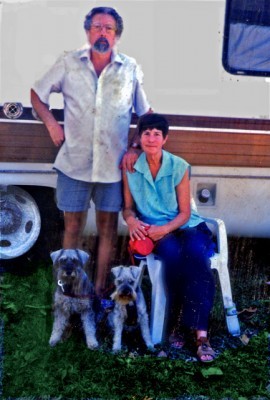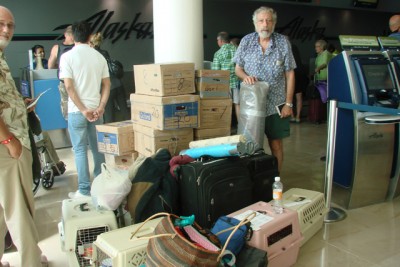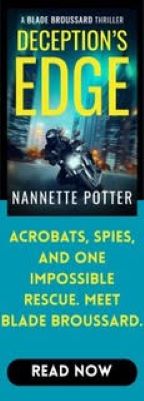by Maria Ruiz
Maria often shares stories with us about Santa Barbara history, her travel all over the world, her dogs, and life.
We visited Peru, walked Macho Pichu and the streets of Cusco and Lima, and fought dysentery. We had been traveling for ten years, some time in motorhomes, some time in trains, cars, and planes. Now we were tired and depleted. We flew from Lima to Bogota, on our way to Mexico, where we were to live for the next six years.
We arrived in Bogotá at midnight and the next leg of our flight to Mexico was scheduled for 8 a.m. the next morning. Eight hours wasn’t long enough to do any sightseeing, especially in the early hours of the day. We decided to spend the time at the airport and avoid having to purchase a visa, taxi’s, etc.
We waited at baggage to collect everything we owned in the entire world. Four suitcases and computer comprised our total belongings. Ted found a shopping cart, and we loaded everything into it.
Pushing it out into the now empty airport, we looked for a suitable place to settle down. On the lower level, where we walked, there wasn’t a chair to be seen. Upstairs we could see a lounge area with a small coffee shop open. We pushed our cart back and forth, looking for an elevator.
There were several sets of stairs leading upstairs but no elevator. Tired, we walked back, not believing that there wasn’t an elevator. I finally spotted one behind a desk where a couple of tired people waited to sell tickets to any latecomer. I asked “Can we use the elevator?”
No. They shook their heads, No.
“What do you mean no? Where are the elevators for the public to get upstairs?” They looked at me as if I were asking for the key to the vault.
Ted used his rusty Spanish to point out we had a cart, baggage, and ticket out at 8:00 a.m. The only way upstairs that we could see was using steps. Finally, I guess they felt sorry for the old, tired couple and used their keys to open the elevator and let us in.
It wasn’t the biggest elevator we’d been in. Just enough room for the cart and two people jammed in on the sides, but it did get us to the second floor.
Upstairs, there were rows of slightly padded seats in rows. We sat and looked around. A few people moved about like robots in the early hours. The seats, fortunately, didn’t have arms so Ted stretched out.
I lied down and discovered that while there were no arms, the curve of the seats made lying down comfortably, impossible. “I can’t sleep with these bumps in my back,” I complained. I was still trying to be nice, but I wasn’t feeling nice.
“Well, I didn’t book this flight,” Ted mumbled.
“True. You were just lying in bed complaining about a stomach ache,” I mumbled back. “Anyway, this was the only flight out to Mexico City for four days. The only other one was at 6:00 a.m., and we’d have to leave the hotel at 3:00. You said it was okay.”
He didn’t answer. I looked around and noticed the floor was carpeted. I decided the floor was at least flat so I moved down, using my arms as a pillow to keep my head off the floor. We had been up since early the previous morning and fighting stomach bugs. We both were exhausted. My eyes closed, and my brain was beginning to shut down when a huge racket started up. 
Saws chewing through metal! Banging of hammers and dropped metal on tile floors brought me sitting straight up. I looked around for the offending cacophony and saw that an empty stall next to the chairs was being remodeled. The noise was deafening. Obviously, that would continue throughout the night.
How considerate of management. Don’t make noise during the day when people are walking around talking or eating. Wait until a few of us are caught here at night. I angrily thought.
Fatigue settled over me and I lied down again. I had finally gotten to sleep when another noise and a slight push woke me. Two women stood over me, with a vacuum, large enough to do a regular room in two sweeps. Standing, the boss woman pointed and waited until I moved. I got up and sat on one of the chairs while she showed the other how to vacuum. I thought they were done, but ‘No.’ Now the trainee had to demonstrate that she knew how to vacuum by going over the same area three or four times. After fifteen minutes or so, they were finally finished and moved on. I thought about grabbing the vacuum cord and choking both the boss and the trainee. There didn’t seem to be any witnesses.
It was by now five o’clock. Ted seemed to be asleep, and I hated him. I looked around and saw a couple of people standing by the desk blocking the elevator on this level. I walked over and asked, “Por Favor. Es possible por me a usar (here I pointed to the closed doors) a seis horas?” Maybe not very good Spanish, but I thought it would get the idea across.
They nodded yes, and I staggered back to our belongings. At five-thirty, I woke Ted. How can the man sleep with all this noise?
“It’s five thirty. I’m going to the restroom. Watch the stuff.”
I found and used the restrooms. When I returned, Ted went off. His four day bout with dysentery in Lima, and our stay at the airport was giving him a very greenish color.
It was finally six o’clock, and we gathered ourselves up and made ready.
The two people who had been standing in front of the elevator were gone, replaced by fresh-eyed faces. We approached and asked if we could use the elevator. They shook their heads ‘No.’
“No! I just asked the people who were here and they said yes.” I was trying not to yell or cry.
Ted, who remained calm and speaks better Spanish than me, again explained that we had this cart and needed to get downstairs. They looked at us as if we were crazy. I was thinking, We can’t be the only passengers that have this problem. How do they move people all the time? One of the people picked up the telephone to make a call (maybe we looked like two old people who would take the elevator hostage or something) and after a brief conversation, finally nodded to us the okay.
Downstairs, we checked our baggage, got our boarding passes, and proceeded to customs. There, the man demanded our Colombian Visas. “We don’t have one. We never left the airport.” I said. He didn’t seem to accept that answer and pointed again at my passport. Ted then explained that we spent the night upstairs led to another discussion with a man holding a gun.
In all the years we have been traveling, we have never understood how a simple question and answer can take ten minutes in most of the world. It always sounds to us like the two speaking parties are planning a weekend fishing trip or something. Laughing, gesticulating, and a long look at us, and finally the man stamped our card. We were let through.
We started through the detection device line. We put the bags and computer on the conveyor belt. We were dressed for winter with coats, socks, and heavy shoes. They motioned us to put our shoes on the belt. We dropped the shoes and moved forward through the device. On the other side of the metal detector, a hand held device was passed over our bodies. There was some sort of agitation, and my bag was pulled off the conveyor belt and set aside.
Ted asked, “What did you bring? Scissors?”
“Course not. Do you think I don’t know about flying. It’s the same bag we’ve had since we left Nairobi. Nothing new,” I snapped back.
A very big man with a gun pointed to my bag. Another man pointed to the lock on the bag. I flipped the combination. Not knowing what could be the problem, I unzipped it. The man with the gun came and stood by me as a woman eagerly pulled my clothes out and dropped them on the table. Nothing. The person at the x-ray machine motioned, ‘More’. The woman dug deeper, pulling out my plastic bag which held my toothpaste, shampoo, and brush. She unzipped it and then pulled out the dangerous and outlawed item; a 1/16 inch, thin eyeglass screwdriver. Holding it up for all to see, the x-ray person signed, ‘Yes.’ The gun-toting man watched to make sure the screwdriver was deposited into the trash. Everyone looked at me as if I had tried to smuggle a dangerous weapon past their security. The same eyeglass screwdriver had been in my luggage since we had left Europe, five years and uncounted air flights ago.
Everyone, now finished with the plunder stepped away, leaving me to repack and move on. I pushed my clothes back into my suitcase and zipped it shut.
Over the past ten years we had been in airports and borders all over the world. Usually, after clearing the metal detectors, we were ushered to the gate to wait for the plane. Not in Colombia. We had one more ramp to climb. On each side of the ramp, soldiers with big guns watched the people walk up toward the gate. We were so tired we could only wonder at what would happen if they found someone they didn’t like trying to catch a plane. Would we be caught in the cross-fire? Could we fall to the floor faster than a bullet?
No one started shooting, and we made it to the waiting room safely.



















Oh my goodness. Doesn’t sound like a very happy leg of your travels. Again I marvel at your spunk and ability to continue on such a journey. Home at last, hope you’ve settled down. Happy New Year
Love the Ted & Maria episodes as we have encountered the same situations in our travels, only Maria can tell a story better.
I always enjoy Maria’s stories. I don’t know how she did all she did. Happy she’s home in the USA now
I always love reading the adventures Maria and Ted went through. Happy she’s home and back in the USA
Great reading for me, fabulous that you are safe and like the Ted and Maria episodes.